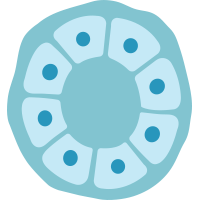
Mammary Cell News
Mammary Cell News is an online resource covering the latest research into breast cancer and mammary cells.
Chemotherapy-Elicited Extracellular Vesicle CXCL1 From Dying Cells Promotes Triple-Negative Breast Cancer Metastasis by Activating TAM/PD-L1 Signaling
[Journal Of Experimental & Clinical Cancer Research] Investigators highlighted CXCL1EV-dead as a novel dying cell-released signal and provided TPCA-1 as a targeting candidate to improve TNBC prognosis.
Toxoplasma gondii Suppresses Proliferation and Migration of Breast Cancer Cells by Regulating Their Transcriptome
[Cancer Cell International] The effect of tachyzoites of T. gondii on human breast cancer cells proliferation and migration was assessed using cell growth curve and wound healing assays.
Procoagulant Platelets Promote Immune Evasion in Triple Negative Breast Cancer
[Blood] Scientists reported that procoagulant platelets beared large amounts of such immunomodulatory factors and that the presence of these cellular blood components in TNBC related to pro-tumorigenic immune cell activity and impaired survival.
Lysophosphatidic Acid Receptor 1 (LPA1) Antagonists As Potential Migrastatics for Triple Negative Breast Cancer
[ChemMedChem] Researchers reported the synthesis and biological evaluation of fluorine-containing triazole derivatives as potent lysophosphatidic acid receptor 1 (LPA1) antagonists, offering potential as migrastatic drugs for triple negative breast cancer.
The Ras-Related Protein RAB22A Interacts with Hypoxia-Inducible Factor 1-Alpha (HIF-1α) in MDA-MB-231 Breast Cancer Cells in Hypoxia
[Molecular Biology Reports] Investigators determined whether these two proteins are present in intracellular complexes in breast carcinoma cells. Evaluation using molecular docking indicated that HIF-1α and RAB22A interact with each other.
68Ga Labeled EphA2-Targeted Cyclic Peptide: A Novel Positron Imaging Tracer for Triple-Negative Breast Cancer?
[Dalton Transactions] To develop a novel PET imaging agent, we prepared gallium-68 (68Ga) labeled-DOTA-SD01 and evaluated its specificity and effectiveness through micro PET/CT imaging in a TNBC-bearing mouse model.
UFL1 Triggers Replication Fork Degradation by MRE11 in BRCA1/2-Deficient Cells
[Nature Chemical Biology] Investigators identified UFL1, a UFM1-specific E3 ligase, as a pivotal regulator of fork stability and the response to PARP inhibitors in BRCA1/2-deficient cells.
Global Breast Cancer Report Finds Inequities Persist
[National Institute for Health and Care Research] A new Lancet Commission sets out recommendations to tackle urgent global challenges in breast cancer. Supported by the National Institute for Health and Care Research, the commission reveals that despite significant improvements inequities persist.
Physiological DNA Damage Promotes Functional Endoreplication of Mammary Gland Alveolar Cells During Lactation
[Nature Communications] Researchers showed that DNA damage accumulates due to replication stress during pregnancy, activating the DNA damage response. Modulation of DNA damage levels in vivo by intraductal injections of nucleosides or DNA damaging agents reveals that the degree of DNA damage accumulated during pregnancy governs endoreplication and milk production.
Epigenetic Deregulation in Breast Cancer Microenvironment: Implications for Tumor Progression and Therapeutic Strategies
[Biomedicine & Pharmacotherapy] Scientists delve into the complex connections between breast cancer treatment response, underlying epigenetic changes, and vital interactions within the tumor microenvironment.
CDK7 in Breast Cancer: Mechanisms of Action and Therapeutic Potential
[Cell Communication And Signaling] Scientists delineated the biological roles of CDK7 and explicates the molecular pathways through which CDK7 exacerbates the oncogenic progression of breast cancer.
ANXA9 Facilitates S100A4 and Promotes Breast Cancer Progression through Modulating STAT3 Pathway
[Cell Death Discovery] Researchers found highly expressed ANXA9 in metastatic breast cancer tissues, which is correlated with breast cancer progression. In vitro, the functional experiments indicated ANXA9 influenced breast cancer proliferation, motility, invasion, and apoptosis
For over a decade, Mammary Cell News has been keeping the global scientific and medical communities informed about the latest research, reviews, and news in the field of mammary tissues. Our editors gather publications on the topic of mammary cell differentiation and characterization, as well as the progression and treatment of breast cancer. We also keep scientists up-to-date on the latest policy changes, job postings, and events.

 Cancer Stem Cell News
Cancer Stem Cell News Cell Therapy News
Cell Therapy News Dermal Cell News
Dermal Cell News Endothelial Cell News
Endothelial Cell News ESC & iPSC News
ESC & iPSC News Extracellular Matrix News
Extracellular Matrix News Hematopoiesis News
Hematopoiesis News Hepatic Cell News
Hepatic Cell News Human Immunology News
Human Immunology News Immune Regulation News
Immune Regulation News
 Intestinal Cell News
Intestinal Cell News Mammary Cell News
Mammary Cell News Mesenchymal Cell News
Mesenchymal Cell News Muscle Cell News
Muscle Cell News Neural Cell News
Neural Cell News Organoid News
Organoid News Pancreatic Cell News
Pancreatic Cell News Prostate Cell News
Prostate Cell News Pulmonary Cell News
Pulmonary Cell News
